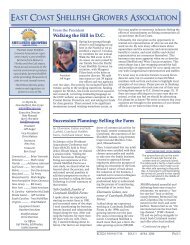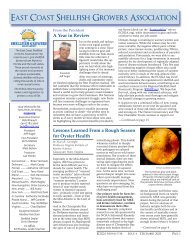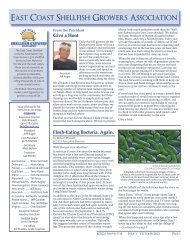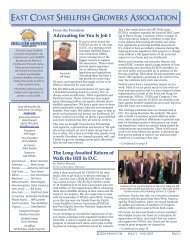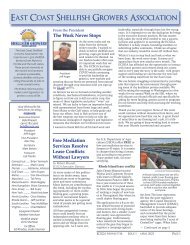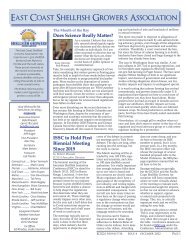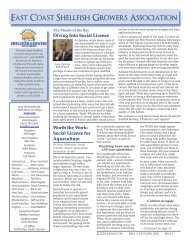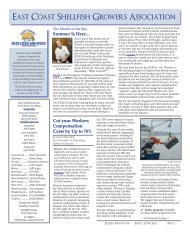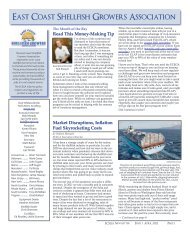East Coast Shellfish Growers Association June 2024 Newsletter
You also want an ePaper? Increase the reach of your titles
YUMPU automatically turns print PDFs into web optimized ePapers that Google loves.
—Continued from page 1<br />
Birds on Gear a Problem<br />
formally accepted by the FDA in<br />
a few months.<br />
I headed up two sessions at the<br />
National <strong>Shellfish</strong>eries <strong>Association</strong><br />
annual meeting in March,<br />
and posted the notes from those<br />
sessions 1 and a brief webinar 2 on<br />
shellfish sanitation and birds to<br />
the ECSGA website.<br />
This spring the ISSC Executive<br />
Board agreed to establish a committee<br />
to conduct a literature<br />
review, and to hold a workshop<br />
on guano remediation. One of<br />
the key challenges: although<br />
sea birds excrete high levels of<br />
coliform-indicator bacteria, they<br />
only rarely carry human pathogens.<br />
Nevertheless, high coliform<br />
levels can force the closure<br />
of harvest areas even though the<br />
risk of human illness may be<br />
relatively low.<br />
In April the Environmental<br />
Protection Agency published a<br />
283-page document highlighting<br />
how the presence of fecal-coliform-indicator<br />
bacteria is a poor<br />
predictor of risk when waters<br />
are primarily contaminated with<br />
fecal material from non-human<br />
animals (such as dogs, livestock<br />
or wild birds). These Technical<br />
Support Materials 3 are posted on<br />
the ECSGA website and provide<br />
the foundation for discussions<br />
on how to conduct a risk analysis<br />
on bird waste. The hope is<br />
that with continued research, we<br />
can avoid unnecessary closures<br />
of harvest areas impacted by<br />
nearby birds.<br />
While the risk of human illness<br />
may be low, it is clearly not<br />
negligible. <strong>Growers</strong> should do<br />
everything possible to deter birds<br />
from landing on their gear, and<br />
plenty of new ideas and refinements<br />
are being developed and<br />
evaluated. At minimum, guano<br />
on food is a bad look, but it<br />
can be catastrophic if it results<br />
in closing growing areas. Stay<br />
tuned for more developments on<br />
this issue.<br />
Hyperlinks<br />
1. ecsga.org/bird-interactions/<br />
#nsa-notes-11<br />
Covering Your Operation From Ship-to-Shore and Shore-to-Door<br />
Brendan Crawford<br />
Marine Insurance Advisor<br />
O. 401.314.4658<br />
C. 401.477.2277<br />
E. bcrawford@crvinsurance.com<br />
Our Specialties Include<br />
Aquaculture, Wholesale Seafood, Commercial Vessels<br />
Marine Manufacturing, Retail Markets, Restaurants<br />
Ocean Marine, Specialty Operations<br />
Answers in Hours,<br />
Not Days<br />
ELISA test kits for ASP, DSP,<br />
Saxitoxins and Brevetoxin<br />
• Quantitative answers in ~2 hours<br />
• Test shellfish or seawater<br />
• Proven ELISA technology<br />
• Require only basic lab skills and equipment<br />
See our Algal Toxin and Marine Biotoxin<br />
test kits at www.abraxiskits.com!<br />
We are a proud supporter of the <strong>East</strong><br />
<strong>Coast</strong> <strong>Shellfish</strong> <strong>Growers</strong> <strong>Association</strong><br />
2. ecsga.org/bird-interactions/<br />
#shell-san-birds-ppt<br />
3. ecsga.org/bird-interactions/<br />
#epa<br />
Gold Standard Diagnostics Horsham, Inc., PA, USA | P: 215-357-3911<br />
ECSGA <strong>Newsletter</strong> Issue 2 <strong>June</strong> <strong>2024</strong><br />
Page 19



